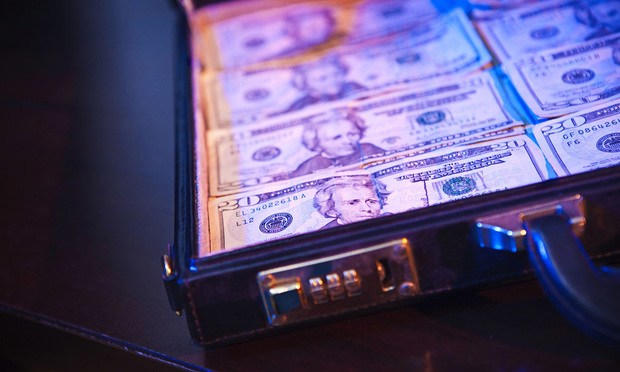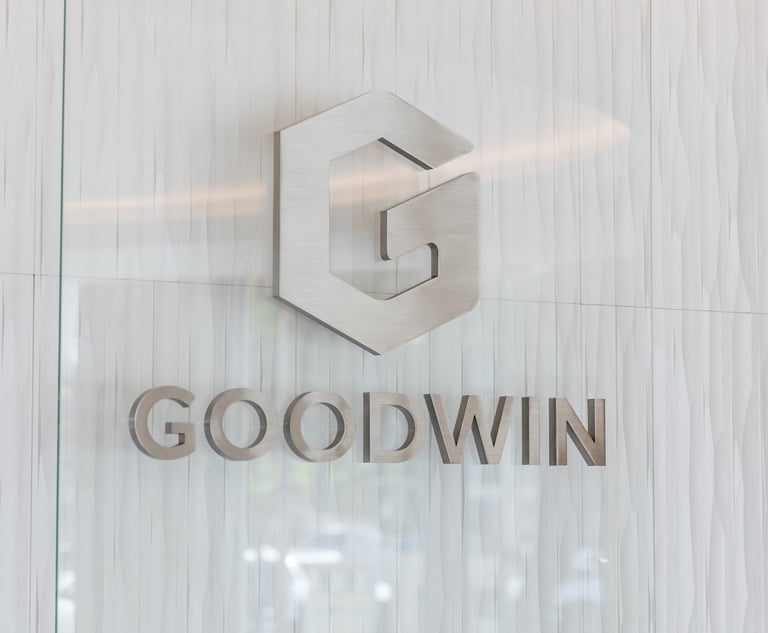7-Year Sentence for Ex-IP Lawyer Over $2M Money Laundering Scheme
An IP lawyer with Big Law grooming now faces prison time after admitting to money laundering.
February 05, 2018 at 04:01 PM
4 minute read

A onetime Arent Fox intellectual property partner who seemed to have a bright career when he made partner at age 33 was sentenced on Friday to seven years in federal prison after admitting to laundering more than $2 million from an email fraud scheme.
Raymond Ho, now 48, received the prison sentence in Alexandria, Virginia, federal court, following his guilty plea in October to felony charges of money laundering and conspiracy to launder money. Prosecutors said Ho, an intellectual property specialist who practiced law most recently at the boutique firm IP Law Leaders in Washington, D.C., and previously did stints at Venable and other large law firms, worked with co-conspirators who sent emails from compromised or phony addresses to solicit funds from victims. Between March 2013 and February 2017, Ho moved more than $2 million from the scheme through various bank accounts, including some attorney trust accounts, and put it into accounts that either he or his co-conspirators controlled, according to the U.S. Justice Department.
In addition to the prison term and an order to pay restitution of nearly $2.05 million, Ho forfeited his state bar licenses in D.C. and Georgia, prosecutors said.
Ho tapped Holland & Knight's Timothy Belevetz as defense counsel in the criminal case.
“Raymond is a good person and an excellent lawyer who made a big mistake,” Belevetz said in an email. “He hopes down the road to get back to doing what he does so well—helping clients resolve disputes related to intellectual property issues.”
As reported earlier in the Washington Post, Ho's fall from grace followed a lengthy career as an IP lawyer at several firms. He became a Big Law partner at age 33 while at Arent Fox, according to the Post, and an old biography from his most recent firm, IP Law Leaders, described Ho as a former partner and senior counsel at a number of firms, including Arent Fox; Venable; Hogan Lovells legacy firm Hogan & Hartson; Morris, Manning & Martin; and the now-defunct Novak Druce. He had a wide-ranging IP practice that involved patent and trademark litigation and helping clients strategize around their IP portfolios.
A representative for IP Law Leaders didn't immediately respond to a request for comment on Monday. Ho is no longer listed as an attorney on the firm's website.
Court documents in Ho's criminal case said that the lawyer moved around from firm to firm but generally made a comfortable living until several years ago, when his compensation dropped and he started looking to make money on the side. In a sentencing statement from Jan. 28, Ho's defense counsel said the former IP lawyer attempted several different ventures to try to drum up more income, including raising eels for export to Asia, tuna fishing, selling old railroad tracks for scrap, and brokering a sale of a Chinese restaurant in Maryland.
Most of those efforts were not successful, but Ho did make money as a middleman who would facilitate fund transfers related to business deals in exchange for a commission, according to Ho's sentencing statement. It was in that capacity that Ho first made contact with his prime co-conspirator, called “Chief Onwa,” in 2013.
Onwa was the driving force behind the underlying email fraud scheme, which involved using email addresses that appeared legitimate to convince unwitting victims to transfer money into accounts controlled by the co-conspirators, according to prosecutors. Neither the authorities nor Ho, who communicated to Onwa only by phone and email, know who Onwa really is, or where he is located, according to court documents.
Ho admitted to facilitating several transactions on Onwa's behalf and earning commissions of about $219,000 for that work, according to documents in Ho's case. He also roped in two others to the scheme, including a fellow IP lawyer in the D.C. area who has remained unnamed in court documents.
Eventually, in 2015, Ho became the target of Homeland Security Investigations, a unit of U.S. Immigration and Customs Enforcement. In a sting operation carried out by undercover federal agents, Ho agreed to move funds from several underlying transactions that he believed were the proceeds of smuggling immigrants into the U.S. and firearm sales in Africa.
Ho was formally charged in September and entered a guilty plea in October under an agreement with prosecutors.
This content has been archived. It is available through our partners, LexisNexis® and Bloomberg Law.
To view this content, please continue to their sites.
Not a Lexis Subscriber?
Subscribe Now
Not a Bloomberg Law Subscriber?
Subscribe Now
NOT FOR REPRINT
© 2025 ALM Global, LLC, All Rights Reserved. Request academic re-use from www.copyright.com. All other uses, submit a request to [email protected]. For more information visit Asset & Logo Licensing.
You Might Like
View All

'Taking the Best' of Both Firms, Ballard Spahr and Lane Powell Officially Merge
6 minute read
Buchanan Ingersoll Launches in Chicago With 17-Lawyer Team From Locke Lord
4 minute read
Trending Stories
Who Got The Work
J. Brugh Lower of Gibbons has entered an appearance for industrial equipment supplier Devco Corporation in a pending trademark infringement lawsuit. The suit, accusing the defendant of selling knock-off Graco products, was filed Dec. 18 in New Jersey District Court by Rivkin Radler on behalf of Graco Inc. and Graco Minnesota. The case, assigned to U.S. District Judge Zahid N. Quraishi, is 3:24-cv-11294, Graco Inc. et al v. Devco Corporation.
Who Got The Work
Rebecca Maller-Stein and Kent A. Yalowitz of Arnold & Porter Kaye Scholer have entered their appearances for Hanaco Venture Capital and its executives, Lior Prosor and David Frankel, in a pending securities lawsuit. The action, filed on Dec. 24 in New York Southern District Court by Zell, Aron & Co. on behalf of Goldeneye Advisors, accuses the defendants of negligently and fraudulently managing the plaintiff's $1 million investment. The case, assigned to U.S. District Judge Vernon S. Broderick, is 1:24-cv-09918, Goldeneye Advisors, LLC v. Hanaco Venture Capital, Ltd. et al.
Who Got The Work
Attorneys from A&O Shearman has stepped in as defense counsel for Toronto-Dominion Bank and other defendants in a pending securities class action. The suit, filed Dec. 11 in New York Southern District Court by Bleichmar Fonti & Auld, accuses the defendants of concealing the bank's 'pervasive' deficiencies in regards to its compliance with the Bank Secrecy Act and the quality of its anti-money laundering controls. The case, assigned to U.S. District Judge Arun Subramanian, is 1:24-cv-09445, Gonzalez v. The Toronto-Dominion Bank et al.
Who Got The Work
Crown Castle International, a Pennsylvania company providing shared communications infrastructure, has turned to Luke D. Wolf of Gordon Rees Scully Mansukhani to fend off a pending breach-of-contract lawsuit. The court action, filed Nov. 25 in Michigan Eastern District Court by Hooper Hathaway PC on behalf of The Town Residences LLC, accuses Crown Castle of failing to transfer approximately $30,000 in utility payments from T-Mobile in breach of a roof-top lease and assignment agreement. The case, assigned to U.S. District Judge Susan K. Declercq, is 2:24-cv-13131, The Town Residences LLC v. T-Mobile US, Inc. et al.
Who Got The Work
Wilfred P. Coronato and Daniel M. Schwartz of McCarter & English have stepped in as defense counsel to Electrolux Home Products Inc. in a pending product liability lawsuit. The court action, filed Nov. 26 in New York Eastern District Court by Poulos Lopiccolo PC and Nagel Rice LLP on behalf of David Stern, alleges that the defendant's refrigerators’ drawers and shelving repeatedly break and fall apart within months after purchase. The case, assigned to U.S. District Judge Joan M. Azrack, is 2:24-cv-08204, Stern v. Electrolux Home Products, Inc.
Featured Firms
Law Offices of Gary Martin Hays & Associates, P.C.
(470) 294-1674
Law Offices of Mark E. Salomone
(857) 444-6468
Smith & Hassler
(713) 739-1250










